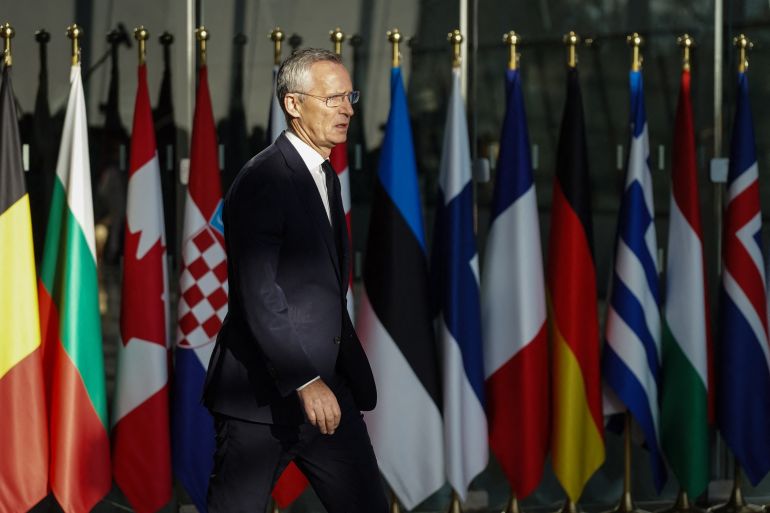NATO chief urges allies to ‘stay the course’ in supporting Ukraine
Jens Stoltenberg meets alliance’s top diplomats amid some resistance in US, Europe to keep funding war against Russia.

NATO chief Jens Stoltenberg has urged members of the security alliance to continue backing Ukraine in its battle against Russia’s invasion amid opposition in the United States to a military aid package and resistance in Europe for a longer-term support plan for Kyiv.
“We just have to stay the course. This is also about our security interests,” Secretary General Stoltenberg said on Tuesday at a meeting of NATO foreign ministers in Brussels.
Keep reading
list of 4 itemsUkraine sees NATO air technology as key to a breakthrough on the ground
Sweden’s NATO bid delayed in Turkish parliament
At least three killed as storm hits Russia, Ukraine’s Black Sea coast
The US has provided more than $40bn in security aid to Ukraine since Russia’s invasion in February 2022 and pledged to back Kyiv for as long as necessary.
But some $61bn in proposed US aid to Ukraine is being held up by the US Congress, while another $50bn package from the European Union is struggling to pass because of opposition from Hungary.
Al Jazeera’s Step Vaessen, reporting from Brussels, said the funding delays show indications of “fatigue” from some NATO members 21 months into the war.
US Secretary of State Antony Blinken said the two-day summit was aimed at “strongly reaffirming our support for Ukraine as it continues to face Russia’s war of aggression”.
“I’m confident that the United States will continue to provide support because it is in the security interest of the United States to do so and it’s also in line with what we have agreed,” Stoltenberg said.
Stoltenberg pointed to recent pledges from Germany and the Netherlands worth 10 billion euros ($11bn) as proof that NATO remained committed to backing Kyiv.
“Even though the frontline has not moved so much, the Ukrainians have been able to inflict heavy losses on the Russian forces,” he said.
Concerns have ratcheted up over the future of Western backing for Ukraine as Kyiv’s top general has admitted that the fierce fighting has reached a “stalemate“.
Ukraine’s Foreign Minister Dmytro Kuleba will try to overcome such fatigue and lobby for continued NATO backing when he joins the summit on Wednesday.
Kuleba will also work with NATO ministers to outline a plan for reforms aimed at helping Ukraine gain eventual membership in the alliance.
Russia has said NATO expansionism is at the core of its grudge against bordering Ukraine, which it has repeatedly warned not to join the alliance.
More than 500,000 troops from Russia and Ukraine are estimated to have been killed or wounded since Moscow marched troops across its neighbour’s border in February 2022.
At least 10,000 civilians have also been killed in the conflict, the UN Human Rights Monitoring Mission in Ukraine has said.
Broader regional security
The ministers planned to discuss Russia’s “destabilising actions” throughout the region, including allegations it has been enabling undocumented migrants to reach neighbouring Finland.
Finland on Tuesday announced that it will close its entire border with Russia to travellers for the next two weeks in a bid to halt the unusually large flow of asylum seekers to the Nordic nation, which the government and its allies called an orchestrated move by Moscow.
The ministers are likely to address the seven-week war between Israel and Hamas, though it is not officially on the agenda.
Al Jazeera’s Vaessen said the ministers would discuss “not only the extension of the ceasefire [between Israel and Hamas] but a future for Gaza after the war is finished”.
On China, Stoltenberg said: “China is not an adversary, but at the same, we must be clear-eyed about the impact of China’s coercive policies on our security.”
Sweden’s membership bid
Hanging in the background is the membership status of Sweden, which has been awaiting ratification from Turkey and Hungary for 18 months.
Stoltenberg on Tuesday told Hungarian media he expected the two countries to approve Sweden’s membership bid without further delay, but gave no precise timeline.
The Turkish parliament started this month to debate Sweden’s bid to join after President Recep Tayyip Erdogan launched the process following a deal at a NATO summit in July, but the legislature’s foreign affairs commission decided to delay the vote after lawmakers expressed reservations.
Turkey has demanded that Sweden take more steps to rein in local members of the Kurdistan Workers’ Party (PKK), considered a “terrorist” group by Ankara, the EU and the US.
Sweden and Finland requested to join NATO in May last year following Russia’s invasion of Ukraine. In order to join, a country must be approved by all current members. While Finland’s accession was approved in April, Turkey and Hungary have yet to approve Sweden’s application for membership.